La Jolla Playhouse kicks off its annual Without Walls, or WOW, Festival on Thursday. It is a four-day celebration of immersive, interactive and non-traditional art experiences from local, national and international artists, all on the UC San Diego campus.
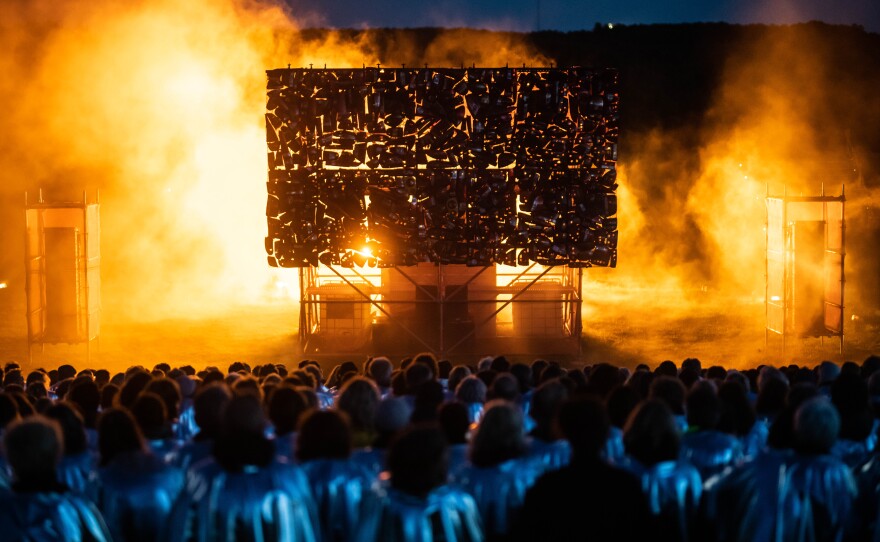
What is WOW?
If you have never experienced the WOW Festival, then you need to be prepared for anything. The idea behind the festival is to inspire artists to create site-specific works and to abandon preconceived notions of what theater is in order to imagine what it can be.
La Jolla Playhouse artistic director Christopher Ashley launched the WOW program in 2011, with the first festival in 2013. Although he cited European art festivals as his inspiration, I have always seen WOW as a kindred spirit to the Edinburgh Festival Fringe, which spontaneously began in 1947 (the same year the Playhouse was founded by Gregory Peck, Dorothy McGuire and Mel Ferrer), when eight theatre groups turned up uninvited to perform at the official Edinburgh International Festival.
Hugo Williams is with the Australian company Pony Cam, which has performed at the Edinburgh and Melbourne Fringe Festivals. He offered this comparison of Fringe and WOW.
"Ultimately, the difference is that Fringe festivals are open access, which means anyone can perform in a variety of ways within the available venues that they have," Williams explained. "I think what WOW Festival is offering is actual programming and curation. They have an intention to make a lot of stuff available to a large amount of audiences, mostly for free. And their goal is to create work that meets people at any place they're at with watching theater or performance that really surprises them. What WOW Festival is trying to do is create performances that are more relevant for right now."
Pony Cam's 'Burnout Paradise'
The WOW Festival is not just theater without walls — it’s theater without restrictions — which is exactly what excites young artists like Williams. He will be performing in this year's WOW Festival in "Burnout Paradise" at UC San Diego’s Price Center East Ballroom.
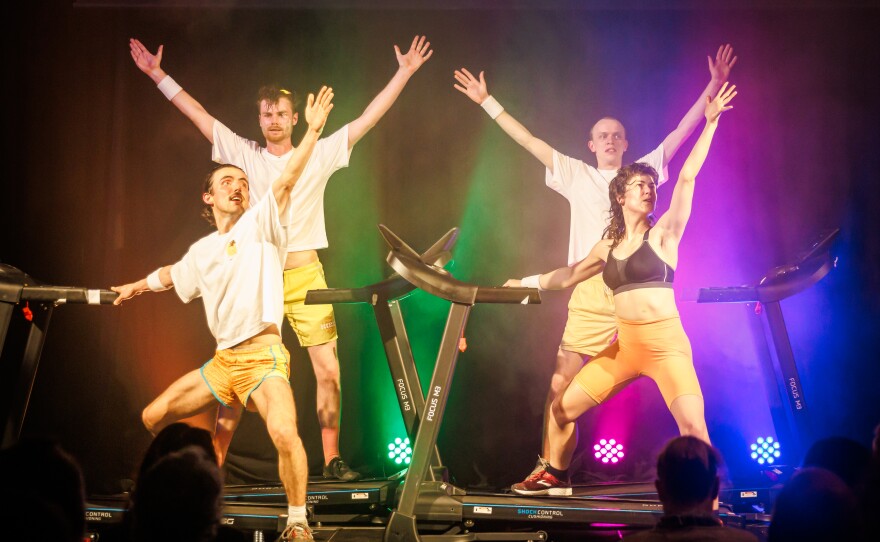
"'Burnout Paradise' is a theater show or a performance. But unlike other shows where we pretend to be characters, we're mostly just ourselves. And we set ourselves a challenge at the start of this show. And that challenge is that we're going to run on treadmills for the whole of the show," Williams explained. "And while we run, we do lots of tasks that people really shouldn't do on treadmills. We cook a three-course meal. We try and submit a grant application."
Wait, a grant application?
"Mate, it's ridiculous," Williams added with a laugh. "It's the hardest task by an absolute mile. It's just trying to get your brain to switch into writing coherent sentences while running at eight miles an hour is just an enormously difficult thing for my brain to do."
But wait, there’s more.
"And if we fail to run the furthest we can run and do all those tasks," Williams said, "then we give the audience their money back at the end of the show."
That's high stakes for a small company's financials, so the performers do reach out to the audience for help.
"We don't say that people need to get involved, and by no means do audiences need to participate in the show," Williams said. "What we say at the start is we're not very good at what we do. We're running, we've got to cook, we've got to do these things. So we might ask for help. And if you want to help, we'd love it."
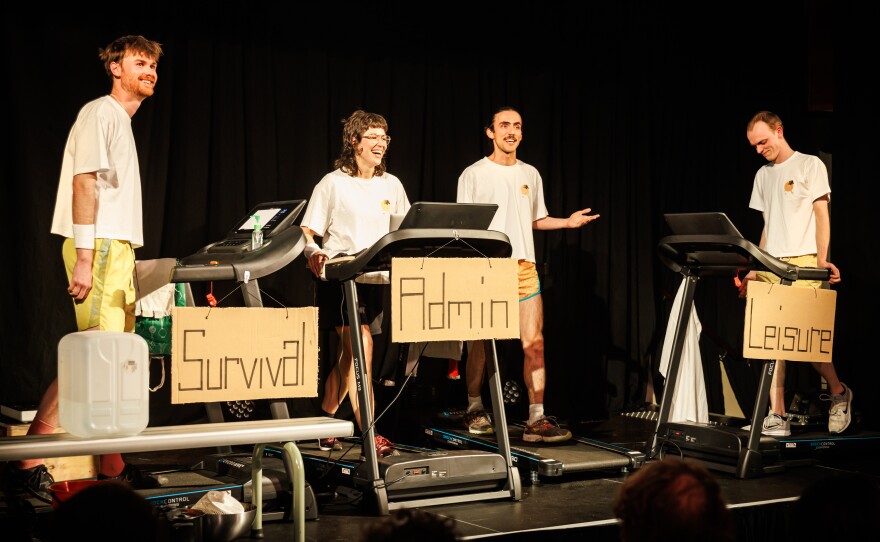
Pony Cam is both a young company and a company of young performers trying to wrestle with the idea of what kind of art they want to make and why they want to make it.
"So almost all of our works are formerly attempting to experiment in that way," Williams stated. "What is the most accessible and interesting way to talk about why we gather in spaces and share stories together? Potentially, we feel that this type of performance — that is quite real, with us doing real things on stage that audiences can help us with — is actually a much more productive and exciting use of the form of theater than having to make people sit down in the dark and watch characters in Russia perform a story set in the early 20th century. We feel like this form perhaps has more relevancy to the modern time."
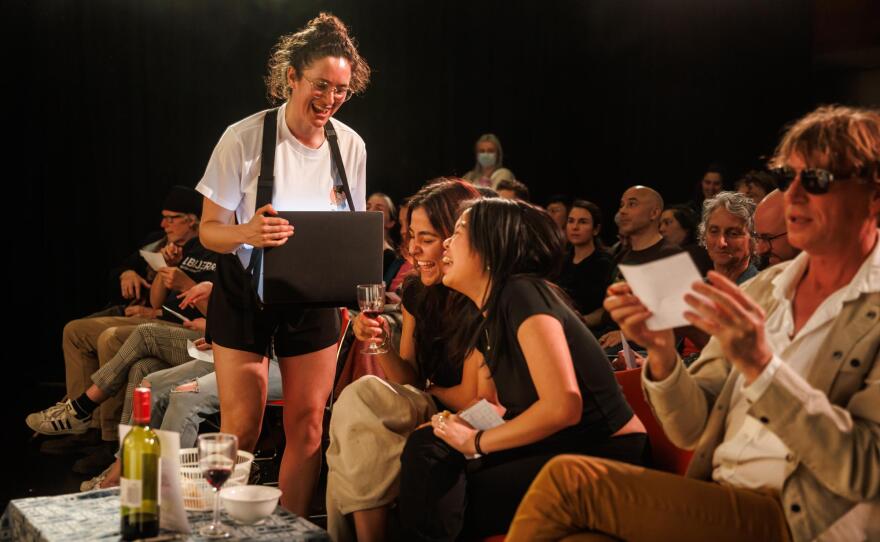
More relevance and more engagement from the audience. Instead of passively watching actors on stage, they become more like fans at a sporting event, actively cheering on their team.
"It is the closest I've felt to what it must be to be a professional athlete," Williams said. "If we complete all of those tasks in the last moment, audiences are really cheering at a level — that real, guttural screams."
It's not just about creating interactive theater, it's about creating a community.
"The more people get involved, what you see is a whole community coming together to care for us," Williams explained. "And then once an audience realizes that that's their function is to care for us, and maybe not to judge us or to judge themselves, it creates this beautiful spirit in the room that's really, really lovely. It's quite life-affirming, I find. Very collaborative. And there's a real sense that if we do succeed, it's because of the real help that audiences have given."
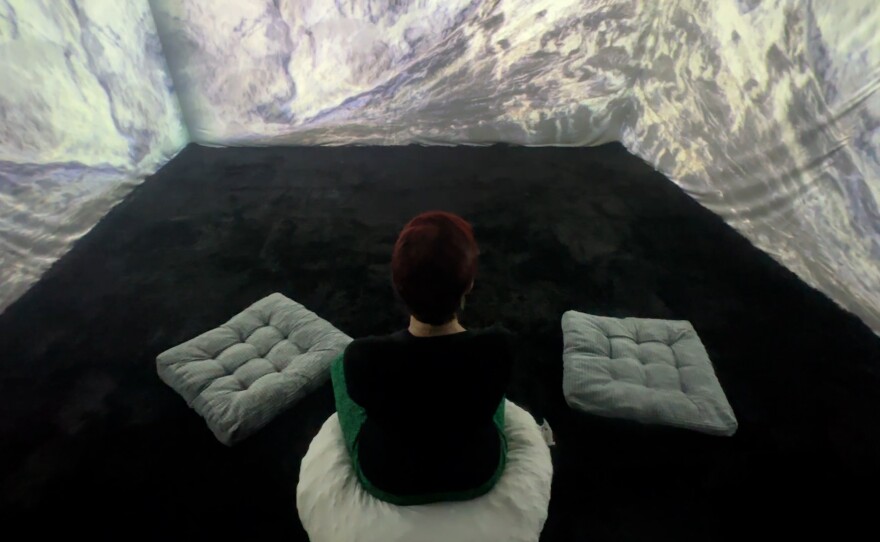
'Green Memories'
A different kind of audience collaboration takes place over at Qualcomm Institute's Immersive Media Lab on the UC San Diego campus. If "Burnout Paradise" engages in a sweaty exercise of sensory overload, then "Green Memories" offers a calming escape from the bustle of the world.

Shahrokh Yadegari is the co-creator of "Green Memories," and a faculty member of the UC San Diego Department of Music as well as associate director of the Qualcomm Institute.
"The piece is really meant for people to have a moment to relax and meditate on our position on Earth, our connection to the Earth and our ecology," Yadegari explained.
The immersive space surrounds you on three sides with screens and has an inviting furry, black silken carpet and throw pillows.
"So currently, we have three projectors here, and there are 32 speakers behind the screens, including eight speakers on the ground that emanate sound up. So you're really surrounded by audio," Yadegari elaborated.
Yadegari composed the music for "Green Memories" and has collaborated with visual artist and co-creator Memo Akten, singer Azam Ali, violinist Keyavash Nourai and space manager Uday Mehra to bring the project to life for WOW 2025.
The music is soothing and beautiful, and the images are equally calming — at least at the beginning. But gracefully flowing water gives way to fiery images that look to be a figure in flames dancing. And then it ends with a view of tides and the Earth.
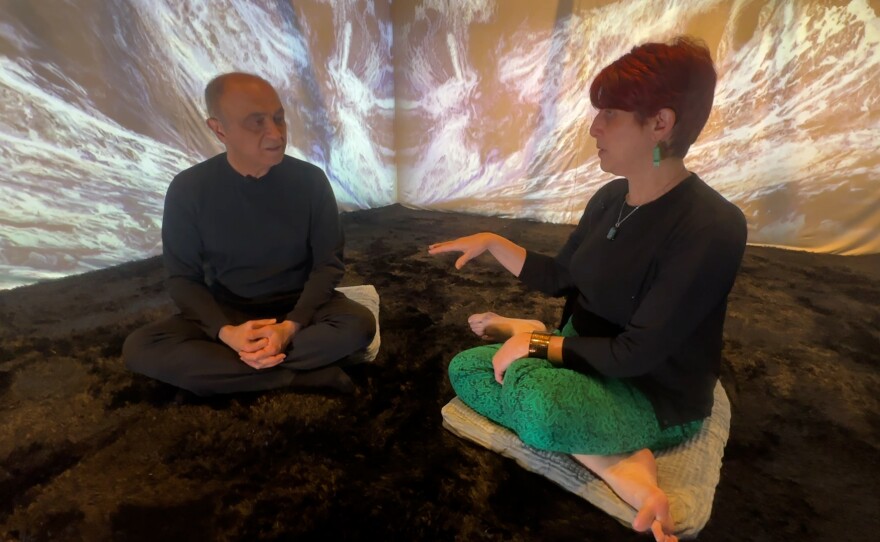
The piece is based on a poem by Forough Farrokhzad called "I Pity the Garden," which on the surface is about the little garden behind her house.
"The poem reads, 'No one thinks of the flowers, no one thinks of the fish, no one wants to believe that the garden is dying, that its heart is swollen under the sun, and its mind is slowly draining of green memories.' I should say she wrote these lines in 1959," Yadegari said.
But the poem remains powerfully resonant today.
In "Green Memories," Yadegari chooses to begin with the beautiful voice of Ali singing in a language that she has created.
"This is a technique that she uses in order to create musical phrases without using any specific language," Yadegari explained. "But at the end, that poem is sung in English. The idea is for us to sit through this moment, meditate, relax, but then at the end, with these words, we're faced with a rather startling reality. That's what I really hope that people take out of this little moment — that we also understand our responsibility towards Earth."
WOW Festival on campus
Yadegari is thrilled to be part of the WOW Festival and to have it back on campus.
"I absolutely love it," Yadegari enthused. "I think the WOW Festival ignites so many different aspects of the campus. I always say when the WOW Festival comes, it brings the campus to life, and I'm also extremely delighted that the Qualcomm Institute is one of the sites that they will have a number of pieces performed there."
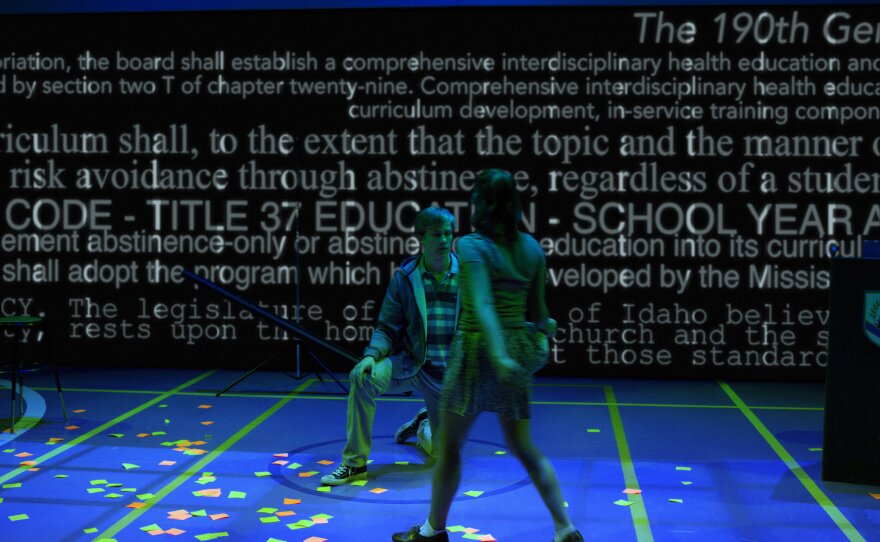
In addition to "Green Memories," the Qualcomm Institute will also host "Artists Everywhere," "Bring Back the Happening," "How to Put On a Sock" and "The Society of Historic Sonic Happenings." And "Goldilocks Screentime" will be performed in front of the institute by the Stuart Collection's Bear.
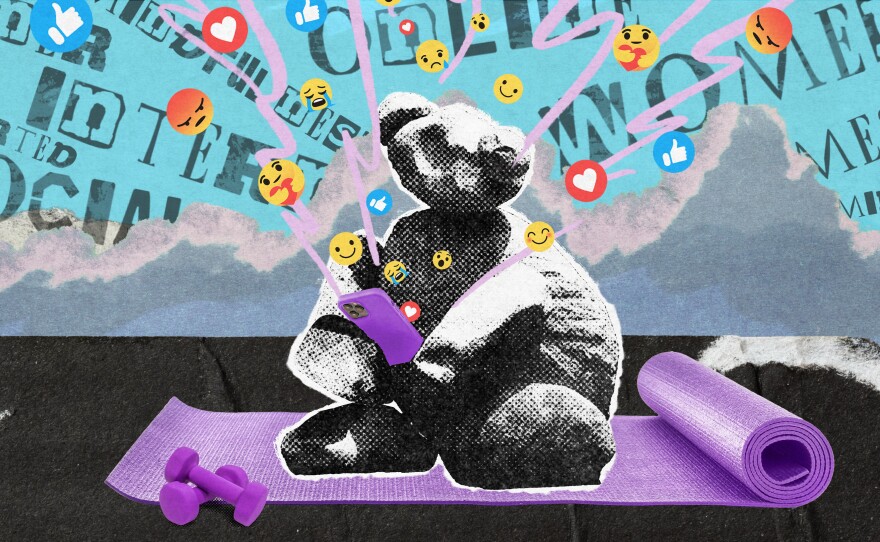
The WOW Festival will activate multiple spaces across campus, from the Qualcomm Institute to the Geisel Library to the 180-ton Bear in the Academic Courtyard. With 20 new works, you might engage in a time travel escape game, put on a dinosaur costume or simply sit back and enjoy a concert or puppet procession. But whatever you do: abandon all expectations and prepare to be wowed.
The Playhouse offers these tips on how to WOW.















